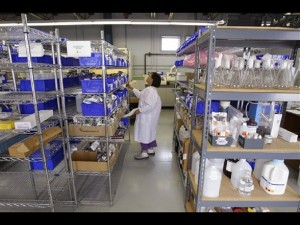‘Skills gap’ leaves firms without worker pipeline

Packaging technician Grace Legaspi searches for a piece of equipment at Ultra Scientific Analytical, a company that develops water purification standards and testing, in R.I. , USA. The company is looking to add 15 to 20 employees to the 49 currently employed over the next year but is having difficulty finding qualified workers. AP
PROVIDENCE, Rhode Island — John Russo’s chemical lab has been growing in recent years, even despite a deflated economy, and he expects to add another 15 to 20 positions to his 49 employees over the next year.
But the president of Ultra Scientific Analytical Solutions has found himself in a vexing spot, struggling to fill openings that require specialized training in a state where the jobless rate is close to 11 percent, the third-highest in the nation.
“It’s very difficult to find the right person, and there’s all walks of life trying to find jobs. I honestly think there’s a large swath of unemployable,” said Russo, whose firm manufactures and supplies analytical standards. “They don’t have any skills at all.”
He’s talking about the so-called skills gap, a national problem that has left businesses across the U.S. without a crucial pipeline of the skilled workers they need in a rapidly changing economy.
States from Rhode Island to Washington are taking steps to address the gulf. Michigan launched a “No Worker Left Behind” initiative, allowing unemployed or low-wage workers to get up to $10,000 in free tuition for community college study or other training. Several legislatures passed bills creating “lifelong learning accounts,” which help workers save for education, training or apprenticeships. The Aspen Institute is spearheading a national campaign that aims to do something that hasn’t happened nearly enough: get community colleges and employers talking.
The need for such efforts, experts say, is enormous.
In a major report in February, Harvard University highlighted what it called the “forgotten half” of young adults who are unprepared to enter the work force. Some drop out of high school. Some who finish can’t afford college. And some who can afford it find that what they’ve learned in college or vocational programs doesn’t match employers’ demands.
“Our system for preparing young adults is broken,” said William Symonds, director of the Pathways to Prosperity Project at Harvard’s Graduate School of Education. “We’re not saying that the system is failing everybody, but it is leaving a lot of young people behind.”
Educators and business leaders say that a “college for all” mentality is no longer realistic, if ever it was. Many positions — known as “middle-skill” jobs — don’t require a degree from a four-year institution. The Georgetown Center on Education and the Workforce estimates there will be 47 million job openings in the decade ending in 2018. Nearly half will require only an associate’s degree.
Career and technical education programs, once derided as being for those who couldn’t cut it academically, offer one path. But growing those programs has not been a national priority and their quality is inconsistent at best. Education Secretary Arne Duncan has called career and technical education the “neglected stepchild” of education reform.
U.S. Rep. James Langevin, who co-chairs the bipartisan Career and Technical Education Caucus in Congress, wants to change that. He has pushed to expand federal funding for such programs so they can access state-of-the-art technology and equipment. He notes that Perkins Act funding has remained stagnant over the last decade even though demand for career and technical education programs has increased. The funding was cut in the current fiscal year.
The caucus co-chairman, U.S. Rep. Glenn Thompson, points to the story of Tricia Reich, 18, who graduated this month from the Central Pennsylvania Institute of Science and Technology. The school trains students in everything from heavy equipment operation and dental assisting to building construction and landscape design.
In the automotive technology program, Reich learned everything there is to know about how a car works. She spent her third and final year not in the classroom but working at an auto dealership, at first earning $8 an hour as a service writer. She’s now employed at another dealership that sells and services Mercedes, Volvos and Audis, saving money in hopes of attending community college.
Reich said programs like hers give students “a leg up” once they get in the real world. “It’s definitely a big plus,” she said.
Rhode Island has been hit harder by the recession than many states, undergoing a difficult transition from an economy historically made up of low-tech, low-skill manufacturing and service jobs to a “knowledge” economy centered on IT, bioscience and health care and other such fields.
The skills gap is already taking an economic toll. Some businesses spend tens of thousands of dollars to “skill up” new employees. Leaving positions unfilled is hardly better. Understaffed firms, particularly small ones, can’t deliver goods as fast as they need to or take on new customers.
The problem is likely to become even more acute as the economy picks up.
“If we don’t address this skills problem, American businesses will lack the world-class work force needed to compete at a global level, and many Americans will remain out of work, instead of accessing the high quality jobs of today and tomorrow,” said Penny Pritzker, a Chicago business executive who is advisory board chair of the Aspen Institute’s skills gap campaign.
It took Ultra Scientific’s Russo more than half a year to fill one of those jobs. Until recently, he couldn’t find anyone to operate a specialized piece of equipment that performs high-pressure liquid chromatography, a technique that separates compounds in a solution.